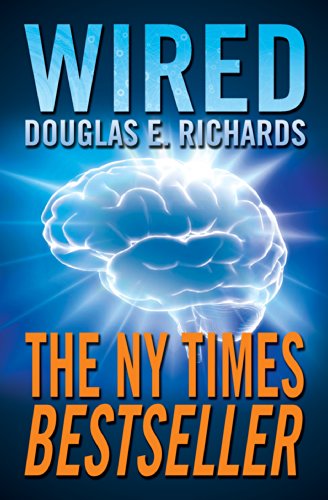 What I probably liked best about his 4-5 star science fiction story is that it hints of golden age Heinlein or Asimov while skipping the golden age's glaring foibles. In those days, science fiction writers were often like having teachers of future science telling you an exciting story about how it will be, THEN. That, and I think Mr. Richards wants to test the idea of how long he can get a reader to hold their breath.
What I probably liked best about his 4-5 star science fiction story is that it hints of golden age Heinlein or Asimov while skipping the golden age's glaring foibles. In those days, science fiction writers were often like having teachers of future science telling you an exciting story about how it will be, THEN. That, and I think Mr. Richards wants to test the idea of how long he can get a reader to hold their breath.The author, or editor, knows commercial fiction rules, like… something has to be happening at least every other page. This makes the book an extremely fast and exciting read. This is the case with Wired.
In retrospect, the prologue seems odd at best. Introduce one of you main characters with a false name being betrayed by one of the bodyguards she hired to guard her. No doubt that turned out to be a solid hook dragging you quickly into the book, but looking back, it seems irrelevant, except for the mighty fact it does drag you over lumps and bumps well into the story.
The story starts proper with another of our main characters, David Desh, an ex-special forces soldier, being asked by a top tier black ops officer, Col. Jim Connely to come in and consult on an operation their black operatives have already failed more than once. This alerts us that David is extraordinary, and he's being asked to do a job his fellow special ops buddies have already failed. It tells us just by the meeting that the Colonel in charge believes David Desh is uniquely qualified to do the job. Then we learn rather quickly that the mission is a higher priority than trying to stop UFOs from messing with our nuclear arsenal.
The threat is Kira Miller, a genius who was of Einstein quality when she was ten, who's gifts with biology and genetics is far above the best in the field. That is before she finds a way to enhance her intelligence. What has the black ops office dragging in one of his best ex-operators, is this genius is working with terrorist and the kinds of things she reportedly can do with genetics and bio-weapons would frighten a psychopath. Imagine a virulent airborne virus genetically engineered to kill anyone who ingests pork, but is harmless to those who don't partake.
This isn't the fright, although the idea is examined, but it outlines the kind of threat this woman is. That…, and her mother, father, brother, and ex-boss have all been murdered by her. Oh, she took out both six men special ops teams sent after her like they were flies, and she had industrial bug spray already waiting for them.
Straight off, this series promises to be exciting.
There are some rookie writer things that can be distracting. Pro writers teach rookies, "show, don't tell". After you're told "she's dangerous" more times than grandpa pees every hour, you're ready to "see" her being dangerous. As if learning on the job our author does get the hang of it, but it seems cliche and too much telling for my tastes, but in his favor, Mr. Richards seems to have figured it out by the end of the novel. That or you're just too breathless to notice anymore.
What Mr. Richards does have going for him start to finish is he doesn't "Just want to write" nor "Just be commercially successful". He wants to share and explore ideas as if he were a golden age Sci Fi writer. In those golden days the stories were often primarily about "the idea" or the pseudo-science they hoped would come to be real science. There is a lot of Heinlein like character introspection or interaction that is really about opening the reader's mind to some exciting ideas that can be sparked by current research. In the process Mr. Richards examines morality of his "what-if" ideas.
So, in addition to having an exciting action adventure science fiction story, you have a scientist pondering if advancing their science is good or evil, right or wrong. How it can go wrong and how great it might be if it doesn't go wrong.
Read (and listened) over 5 session from on four days between Thursday, September 26, 2019, and Tuesday, October 08, 2019. This review if of both ebook and eAudiobook with special thanks to narrator Peter Berkrot.
- 9780982618486 (ebook),
- 9781452626987 (eAudiobook),
- Library of Congress
No comments:
Post a Comment